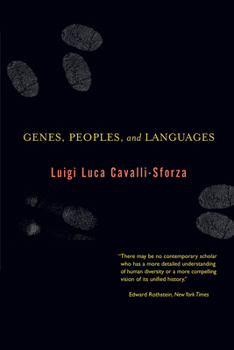Genes, Peoples, and Languages
Select Format
Select Condition 
Book Overview
Luigi Luca Cavalli-Sforza was among the first to ask whether the genes of modern populations contain a historical record of the human species. Cavalli-Sforza and others have answered this question--anticipated by Darwin--with a decisive yes. Genes, Peoples, and Languages comprises five lectures that serve as a summation of the author's work over several decades, the goal of which has been nothing less than tracking the past hundred thousand...
Format:Paperback
Language:English
ISBN:0520228731
ISBN13:9780520228733
Release Date:April 2001
Publisher:University of California Press
Length:239 Pages
Weight:0.65 lbs.
Dimensions:0.6" x 5.7" x 8.2"
Customer Reviews
3 ratings
pretty technical but still provides a good background
Published by Thriftbooks.com User , 21 years ago
Cavlli-Sforza presents a history of the human race looking at how humanity spread out of Africa and has changed and evolved. He looks at things such as blood types and proteins explaining why differences might arise between different groups of people. He looks at different of primates such as neanderthals showing how modern man arose. He also gives reasons for genetic variation such as drift and chance. He also looks at groups such as the Basque and Lapps in Europe who have unique genetic makeups and languages that seperate themselves from other Europeans. One impressive thing that is dealt with in the book was the link between language and evolution. He shows how groupings of languages can show how humans spread through time.
Genes, People, & Languages, not Race, Culture, or Politics
Published by Thriftbooks.com User , 23 years ago
It's difficult to review a book by Luigi Luca Cavalli-Sforza, not because he's obtuse and overly technical - in fact his writing is very readable by non biologists - but because of the fact that this pioneer in population genetics has so much to say about so many fields in modern science drawing from a lifetime of experiences in the field. This is particularly true of GENES, PEOPLES, AND LANGUAGES which is based on lectures that summarize his lifework and theories. The man delves into biology, anthropology, lingustics, statistics, serology, evolution, and of course, genetics. He touches on culture, race, religion, and language; he has theories about human origins, migrations, adaptations, and the switch from hunter gatherers to agriculture. In short in the field of science, when Cavalli-Sforza writes or speaks, people tend to listen and read. We don't necessarily always agree with him, but we'll get to that in a minute.From the early 1950's Cavalli-Sforza says he wondered "whether it was possible to reconstruct the history of human evolution using genetic data from living populations." This epiphany is significant for two reasons. Firstly that he followed up on it and obtained sufficient blood samples and has compiled a massive data base of human genetic data, is incredible in its own right. Secondly it is such a paradigm shift in the way science has studied human evolution and history. No longer were researchers restricted to the slim pickings from archaelogy, anthropology and history, namely: relics, human bones, and ancient documents. Cavalli-Sforza has made three major contributions to science using his genetic data on human migrations: (1) he was one of the first scientists to develop an "evolutionary tree" of human origins (2) he susequently mapped our migrations and (3) he showed that agriculture was transmitted around the world, not by transfer of cultural traits, but by movement of actual people.More than half (4 out of 6 chapters) of GENES, PEOPLES AND LANGUAGES is devoted to looking at human population genetics. There are two other chapters; one each on the relationship between genes and language and the influence of genetics on cultural evolution. These last two chapters although interesting in their own right don't flow with the rest of the book, nor are they as well written; they could definitely have done with more editing.Back to the first 4 chapters and my earlier point that some people disagree with Cavalli-Sforza's opinions. He is a major proponent of the view that there is no biological basis for human races. He would definitely be one who would quote the oft heard refrain that "race is only skin deep", and he provides a wealth of genetic data to prove this point. Race however is a lot deeper than skin, it is in the bones. Ask most anthropologists who deal with the human skeleton, or a forensic expert, and they will probably agree that they can differentiate between races. But wait, ask any biologist who looks at humans throug
A small great book indeed
Published by Thriftbooks.com User , 24 years ago
Five stars is a minimum.I enjoyed every word in this book. No wonder that it is already out of print.I expect a new edition soon.May I ask Professor Cavalli-Sforza to correct the first sentence in page 68. The sentence should read "The only possible pairs are AT,GC,CG or TA....:in front of A in one helix,there can be only T in the other..." Again in page 195 I found " But all {eight} possible word orders exist", I think it is {six}.





